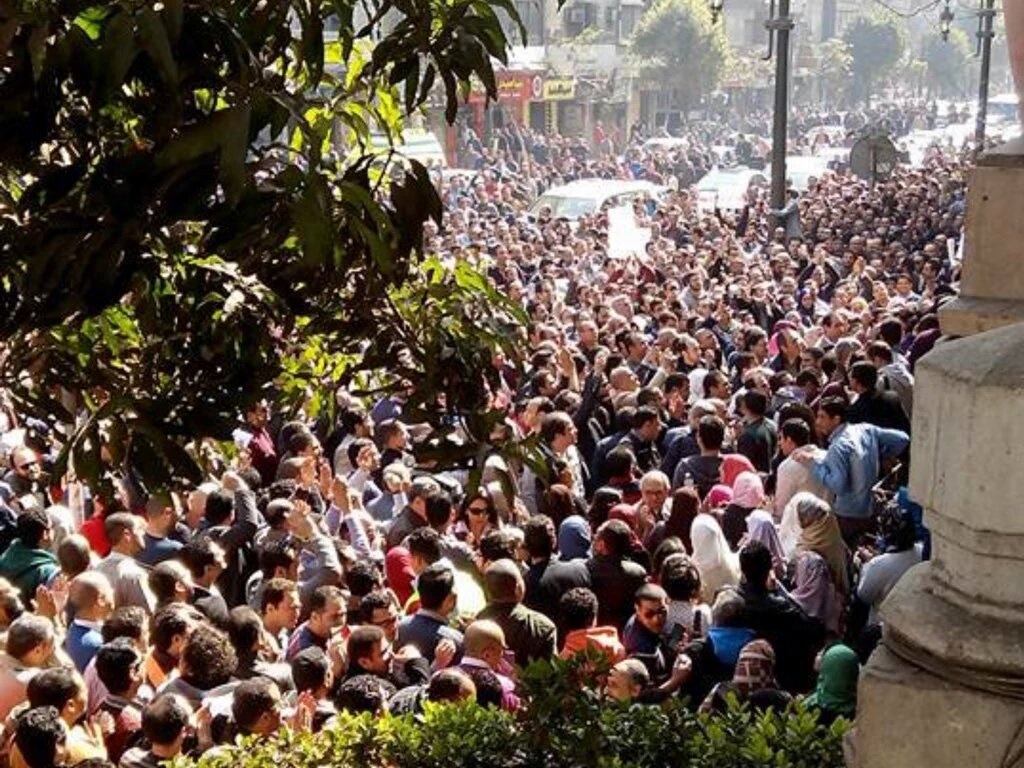As Egypt’s Doctors’ Syndicate held a general assembly on Friday that attracted thousands of medical professionals to Dar El Hekma in downtown Cairo, the doctors’ array of grievances – from the controversial new health insurance law to recent violent attacks on hospitals – came to the fore.
Several doctors who work in different branches of medicine took to the streets to chant against violence, with some tying stethoscopes around their hands to express increasing anger towards the state’s reluctance to handle the attacks on the Matareya Teaching Hospital earlier last month.
Nine policemen attacked doctors Mohamed Abdelaziz and Ahmed El Sayed for refusing to falsify a policeman’s medical report. The policemen were held on charges for violence but later were released on bail.
The assembly was organized in an effort to highlight the doctors’ demands, including the protection of hospitals all around the country from acts of violence and the prosecution of the policemen responsible for the Matareya Teaching Hospital attack.
At the assembly, 44 percent of the doctors in attendance supported a partial strike until demands are met, while 56 voted in favor of doctors working without receiving any payment, effective February 27.
The assembly also agreed on shutting down all private clinics starting March 19.
“If there are any other future attacks on hospitals we, as Egyptian doctors, demand that the hospital under attack is shut down immediately and that there shall be other escalation procedures in this regard,” Secretary-General of the Doctors’ Syndicate Ehab El Taher told Egyptian Streets.
El Taher also urged the Ministry of Interior and the government to provide security to doctors against such attacks, stating that security officers should be present on hospital premises to prevent acts of violence, which disrupt the doctors’ work and negatively affect patients. The assembly also called upon Egypt’s parliament to issue a law implementing harsh punishments in the event of an attack on any hospital.
The protesting doctors denounced the state’s reaction to the crisis thus far and demanded that the Minister of Health resign from his post.
“There is nothing the Minister of Health can do now but to resign as he already has failed to handle the issue on the spot once it happened before it escalates to this extent and we also demand that he gets subjected to a disciplinary board,” said El Taher.
The Ministry of Health was unavailable for comment on these demands.
El Taher said that if the demands outlined during the assembly are not met, there will be another gathering in March to decide on further escalation procedures, including collective resignations from many doctors in response to the government’s response to the issue.
However, El Taher said that this decision will only be implemented by the General Assembly and will not be an obligatory measure, but rather a defensive option to show dissatisfaction.
Controversy surrounding the new health insurance law
Members of the Doctors’ Syndicate and the Medical Professions Union have rejected the new health insurance law, which was issued on January 17.
El Taher described the law as “unconstitutional” due to its exclusion of many fields of medical treatment such as psychotherapy and treatment of psychological diseases, which the Egyptian constitution guarantees citizens access to. According to El Taher, the decision to exclude such medical treatments – which are often quite costly – is an attempt to avoid incurring extra costs for the state.
“The whole law needs to be amended, especially as it contains 13 main controversial articles that will eventually contribute to the privatization of the governmental medical sector in the future,” El Taher told Egyptian Streets.
The new law also includes and article cancelling the Egyptian Fellowship Degree – a required certificate, given by the National Board of Medical Qualifications, for all those practicing medicine – and replacing it with another mandatory degree awarded by foreign trainers who will charge doctors additional fees.
The new law also requires all Egyptians to pay for health insurance memberships, which El Taher said is “not necessarily bad” but may not be within all citizens’ financial means. He stressed on citizens with a “minimal monthly income,” which the Ministry of Social Insurance states is EGP 400, as opposed to the common minimum wage of EGP 1200 per month.
“The current [budget] allocated towards medical services from the general state budget is not enough to provide all citizens with health insurance, nor is it enough to enhance the medical stature in the country,” El Taher said, adding that the state must prioritize healthcare and set up a strategic plan that will ensure covering all health expenses within five years, particularly for poor citizens who cannot bear the brunt of the state’s measures to cut costs.
A 2013 report released by the Egyptian Initiative for Personal Rights (EIPR) stated that only 5 percent of the state’s budget is spent on medical services across Egypt, highlighting a “reluctance” from the state to fund healthcare for its citizens.







Comments (16)
[…] have to undergo the same training and study as police officers, have included sexual harassment, beating of a doctor in a hospital, and the assault of a woman at a Cairo […]
[…] the general assembly meeting, the doctors set forth a list of demands and “escalatory measures” they vowed to take if the government failed to […]